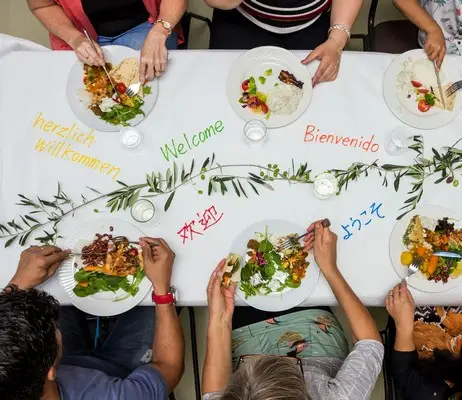Table of Contents
- The Rise of Family Diversity
- Organizational Diversity
- Cultural Diversity
- Class Diversity
- Life Course Diversity
- Cohort Diversity
- The Rapoports’ Legacy in A-level Sociology
The concept of family diversity has become a fundamental topic within A-level sociology, as it challenges the traditional notion of the nuclear family as the dominant family form in the UK. Scholars have long debated the changing nature of family structures and their impact on society. Among the most influential contributors to this discussion are Robert and Rhona Rapoport, whose pioneering work on family diversity in the 1980s provided a framework for understanding the various ways in which families can differ. Their research identified five key aspects of family diversity: organizational, cultural, class, life course, and cohort diversity. In this article, we will explore these five dimensions of family diversity and discuss how the Rapoports’ work has shaped contemporary sociological understanding of family forms.
The Rise of Family Diversity
The Rapoports’ research emerged during a period of significant social and economic change in the UK. By the 1980s, the traditional nuclear family—consisting of a married heterosexual couple and their biological children—was no longer the only predominant family structure. Increasing rates of divorce, cohabitation, remarriage, and lone parenthood had altered the landscape of family life. In response to these changes, the Rapoports sought to challenge the idea that the nuclear family was the only “ideal” or “normative” family form.
The Rapoports argued that family diversity should not be viewed as a deviation from the nuclear family model, but rather as a reflection of a broader range of family experiences and arrangements that have always existed but have become more visible in modern society. They identified five dimensions of family diversity—organizational, cultural, class, life course, and cohort—that highlighted the various ways in which families can differ in terms of structure, roles, and social experiences. Each of these dimensions offers valuable insights into how family life is shaped by a variety of social factors.
Organizational Diversity
Organizational diversity refers to the different ways in which families are structured and the roles that individuals within families assume. According to the Rapoports, family life in the UK is characterized by a wide range of organizational arrangements, moving beyond the traditional nuclear family. These arrangements include reconstituted families (where one or both partners bring children from previous relationships), extended families (where relatives beyond the immediate family live together or maintain close ties), and lone-parent families (headed by a single parent).
In addition to these structural differences, organizational diversity also encompasses variations in the division of labor within families. In some families, traditional gender roles are maintained, with men primarily responsible for earning income and women taking on domestic responsibilities. In others, these roles may be shared more equally, or gender roles may be reversed. Dual-career families, where both partners are engaged in full-time employment, also reflect a significant change in the organization of family life, as they challenge traditional assumptions about the roles of men and women within the household.
The Rapoports emphasized that organizational diversity is not only a reflection of individual family choices but also a response to broader social and economic forces. For example, economic pressures, such as the rising cost of living, have led to an increase in dual-income households, while the availability of social welfare support has facilitated the rise of lone-parent families. In this way, the organization of family life is shaped by both personal decisions and structural factors.
Cultural Diversity
Cultural diversity refers to the ways in which family structures and practices are influenced by cultural and ethnic backgrounds. The Rapoports argued that the increasing ethnic diversity of the UK population has contributed to a greater variety of family forms. Different cultural groups may have distinct beliefs, values, and practices regarding family life, which can shape their family structures and the roles within them.
For example, in some Asian communities in the UK, extended families are more common, and there is a greater emphasis on intergenerational support and living arrangements. In contrast, African-Caribbean families are more likely to include lone-parent households, often due to social and historical factors. Similarly, cultural norms about marriage, gender roles, and child-rearing can vary significantly across different ethnic groups, contributing to the diversity of family forms.
The Rapoports’ focus on cultural diversity highlights the importance of understanding how family life is shaped by cultural practices and traditions. It challenges the ethnocentric view that the nuclear family is the “ideal” family form, encouraging sociologists to consider how different cultural backgrounds contribute to the richness and complexity of family life in the UK. This dimension of family diversity also raises questions about how cultural values are transmitted within families and how these values may change over time as families adapt to living in a multicultural society.
Class Diversity
Class diversity refers to the ways in which family structures and experiences vary according to social class. The Rapoports argued that class differences play a crucial role in shaping family life, influencing everything from family size and living arrangements to patterns of work and leisure. Families from different social classes may face distinct economic pressures and opportunities, which in turn shape their family structures and dynamics.
For example, working-class families may be more likely to experience financial instability, leading to higher rates of divorce and lone parenthood. In contrast, middle- and upper-class families may have greater access to resources, such as private education and healthcare, which can influence their family life. Additionally, social class can shape attitudes towards marriage, cohabitation, and child-rearing, with middle-class families more likely to delay marriage and childbirth in order to pursue educational and career opportunities.
Get the full article AD FREE. Join now for full access to all premium articles.
View Plans & Subscribe Already a member? Log in.





